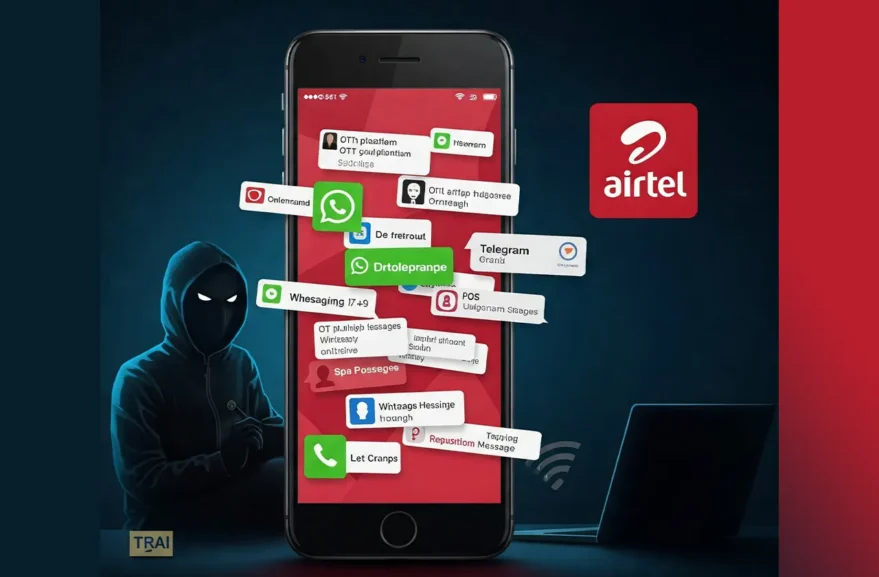- Airtel urges TRAI to regulate OTT platforms like WhatsApp and Telegram to curb rising spam.
- Proposes extending the DCA framework and enforcing KYC verification for digital platforms.
- Telecom operators warn that regulatory gaps in OTT services increase phishing and financial fraud.

With the surge in digital communication, spam and fraudulent activities have also escalated, particularly on over-the-top (OTT) messaging platforms like WhatsApp and Telegram. Recognizing this growing issue, Airtel has called on the Telecom Regulatory Authority of India (TRAI) to introduce regulations for these platforms to curb financial fraud and unwanted commercial messages.
In a formal appeal to TRAI, Airtel’s Vice-Chairman and MD, Gopal Vittal, highlighted that while spam via SMS and voice calls has reduced due to regulatory measures, fraudsters are now shifting to unregulated OTT platforms. Airtel insists that these services require oversight to ensure user security and accountability.
Airtel Telecom Industry’s Concern Over OTT Spam
Airtel, along with other telecom giants like Reliance Jio and Vodafone Idea, has raised concerns about the increasing misuse of OTT platforms for spam and fraud. During TRAI’s open house consultation, telecom operators emphasized that current regulations only apply to traditional telecom services, allowing OTT platforms to operate with minimal restrictions.
Also Read
Key concerns include:
- A rise in phishing attempts and fraudulent calls through OTT services.
- Lack of centralized monitoring, making it difficult to track spammers.
- Increased risk of identity theft due to the absence of proper verification mechanisms.
Airtel’s Proposed Measures for OTT Regulation
To combat these issues, Airtel has recommended several regulatory steps, including:
- Extending the Digital Consent Acquisition (DCA) Framework: This would allow users to manage consent for promotional messages on OTT platforms, similar to SMS regulations.
- Mandatory Know Your Customer (KYC) Verification: Enforcing KYC checks for WhatsApp, Telegram, and other OTT platforms to ensure traceability and reduce fraudulent activity.
- Centralized Spam Blacklist: Creating a common database of spam sources across telecom and digital platforms to curb persistent offenders.
Airtel believes these measures will help bridge the regulatory gap and enhance user security across all digital communication channels.
TRAI’s Response and Regulatory Challenges
Despite these concerns, TRAI has stated that OTT platforms fall under the jurisdiction of the Ministry of Electronics and Information Technology (MeitY). However, the regulator has acknowledged the rising issue of spam and fraud on OTT services and has relayed these concerns to the appropriate authorities.
The challenge remains in defining the regulatory scope for OTT platforms while ensuring compliance with global standards. Striking a balance between consumer protection and maintaining an open internet ecosystem is a key aspect of the ongoing discussions.
Need for Global Standards in Spam Control
Airtel has also advocated for international cooperation to address telecom fraud. The company emphasized the need for:
- Stricter measures against Calling Line Identification (CLI) Spoofing, a technique used by fraudsters to disguise caller identities.
- Licensing requirements and penalties for violators, ensuring accountability for telemarketers and principal entities responsible for spam.
- Enhanced user awareness programs, helping customers recognize and report fraudulent messages effectively.
The Way Forward
With spam and financial fraud evolving, regulatory intervention in OTT services is becoming increasingly necessary. While TRAI has taken steps to address spam in traditional telecom channels, extending similar measures to digital communication platforms could offer a more comprehensive solution.
Airtel’s push for stricter regulations highlights the growing need for a collaborative approach involving telecom operators, regulatory bodies, and OTT service providers. As discussions progress, it remains to be seen how TRAI and MeitY respond to these industry-wide concerns.
Airtel’s concerns over the rise of spam and fraud on OTT platforms have sparked an important debate about the future of digital communication regulations in India. With telecom operators pushing for stricter KYC norms and consent frameworks, the pressure is mounting on authorities to take action. Whether these measures will be implemented remains uncertain, but one thing is clear—ensuring consumer safety in the digital era is now a top priority.







